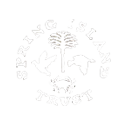Living with Wildlife
Most adult raccoons weigh 10-20 pounds but some individuals can reach almost 30 pounds! They are true omnivores, feeding on a variety of berries and plants as well as insects, fish, frogs, crayfish and small mammals. Many of our coastal raccoons are marsh specialists that feed on a variety of crabs and fish. Their nimble fingers and monkey-like hands help them capture anything small enough to eat. Raccoons do not actually wash their food like the species name Procyon lotor (“a washer”) implies. They do, however, dip prey in the water to tear them apart and remove the unwanted portions of shell, bone and feathers.
Raccoons are considered cute by many, but in reality they are fierce creatures, making a variety of growls and hisses as well as baring vicious-looking teeth. They should not be handled or approached. The bite from a raccoon is very dangerous and rabies is a possibility. While primarily nocturnal, our raccoons sometimes feed in the daytime, especially in the winter, when they can be seen foraging at low tide in the salt marsh.
Raccoons can become serious pests because of their intelligence and the dexterity of their hands. They open cabinet doors, refrigerators and other food caches. They raid trashcans and feed from pets’ bowls. They put up quite a fight if they are so inclined. They have a special fondness for corn, which makes them very unpopular with farmers.
The raccoon management approach is that there are nuisance individuals that can be removed from a residence by trapping. This should take place from September 15 – March 15 when they do not have babies back in their den, which is generally a hollow in a tree. Raccoons can be captured using a variety of live-catch traps. If released, they often return to the same spot where they were captured. It is illegal to transport raccoons from one area to another because of the chance that one might also be transporting rabies into that area.

Copyright © Spring Island Trust
40 Mobley Oaks Ln. · Okatie, SC 29909 · 843-987-7008
Site by Sans Sheriff Studio
